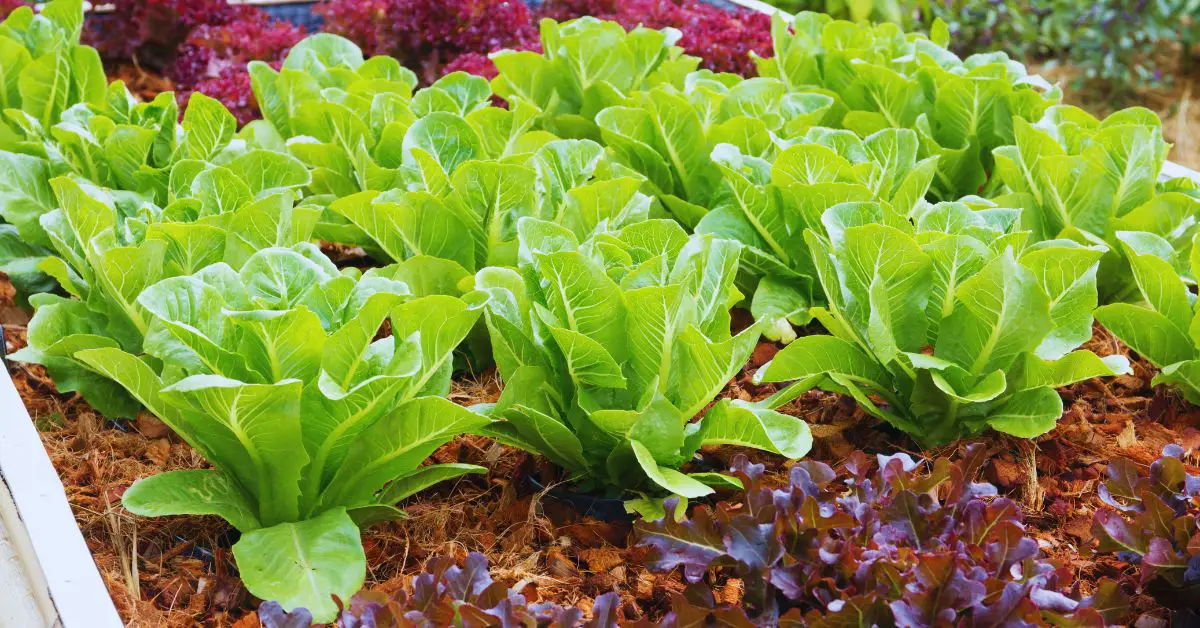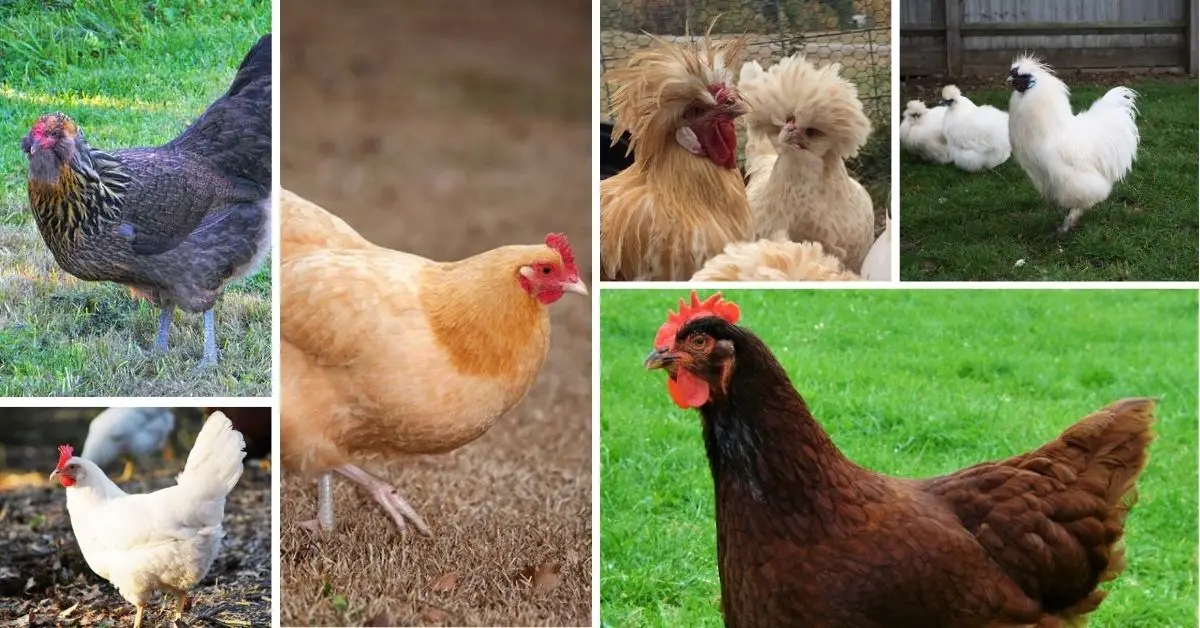Why Fast-Growing Privacy Shrubs and Trees Are Great for Your Yard?
Have you ever wished for a little more privacy in your yard? Maybe you’ve felt like the neighbors are a bit too close for comfort, or the street noise disrupts your backyard relaxation. Planting fast-growing privacy shrubs and trees can be the perfect solution. Not only do they grow quickly to give you the privacy you desire, but they also add beauty and a touch of nature to your surroundings.
Why choose fast-growing varieties? Well, the answer is in the question itself—they grow fast! This means you won’t have to wait years and years to feel the benefits. Whether you’re looking to create a natural fence, block out noise, or just make your yard feel like a secluded paradise, these plants can do the job quicker than most.
In this blog post, we’ll explore the top 32 fastest-growing shrubs and trees that can enhance the privacy of your yard. We’ll dive into the benefits of privacy hedges, discuss the differences between trees and shrubs, and offer tips on how to choose and where to buy the right plants for your space.
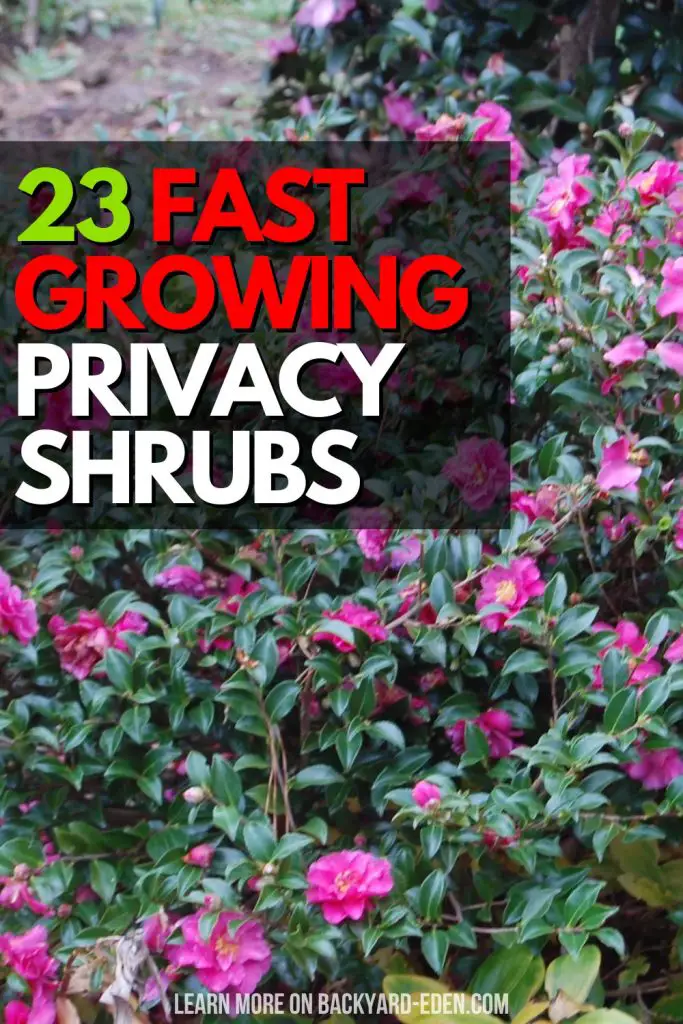
What Are the Benefits of Privacy Hedges?
There are several benefits of growing privacy hedges in your yard. Here are a few of the benefits that we absolutely love.
Privacy
Privacy hedges serve as a natural barrier, keeping your yard hidden from neighbors and passersby. This means more freedom and less worry about being watched while you’re enjoying your private space.
Noise Reduction
Living near a busy road or noisy neighbors can be distracting. Privacy hedges help reduce this noise by absorbing and blocking sound, making your yard a quieter, more peaceful place.
Windbreak
In areas with strong winds, privacy hedges can act as a protective shield for your yard. They reduce wind speed and protect your outdoor areas and other garden plants from harsh wind effects.
Aesthetic Appeal
Privacy hedges enhance the beauty of your landscape with their lush, full growth. They add color, texture, and structure to your garden, making your property look more attractive and well-cared-for.
Boundary Definition
Hedges are excellent for marking the boundaries of your property. They provide a soft, natural line that is more appealing than fences and can help organize different sections of your garden into distinct areas.
Environmental Benefits
Planting hedges contributes positively to the environment. They produce oxygen, help clean the air of pollutants, and offer habitats for various wildlife, enhancing local biodiversity.
Top Fastest Growing Shrubs for Privacy
When selecting shrubs for privacy, the speed of growth is a crucial factor, especially if you’re looking to establish a natural barrier quickly. Here, we will explore some of the top shrubs known for their rapid growth rates, making them ideal for creating privacy in your yard.
1. Skip Laurel Shrub
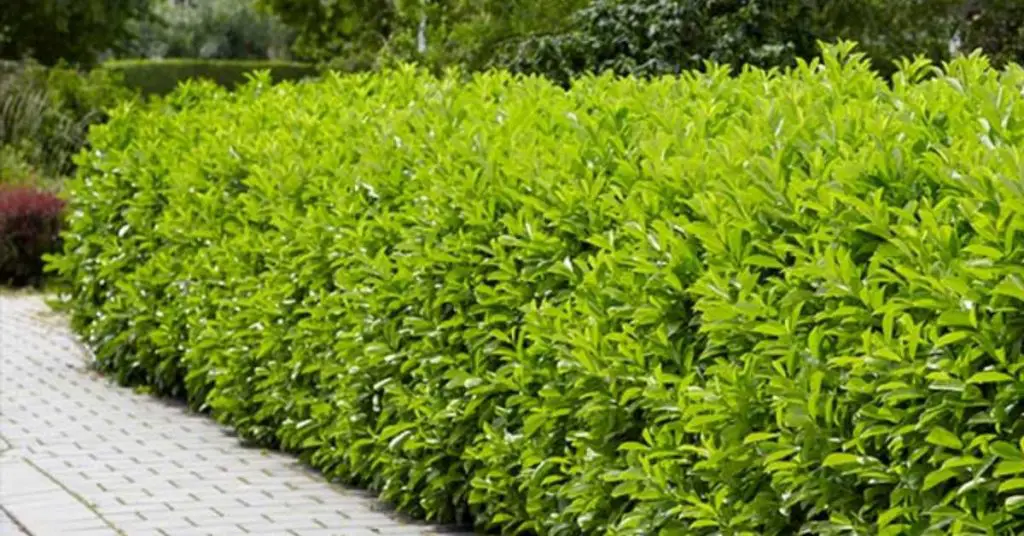
- Scientific Name: Prunus laurocerasus
- Expected Height: Up to 10-18 feet
- Expected Width: 5-7 feet
- Rate of Growth: Moderate to fast
- Sun Requirement: Full sun to partial shade
- Ideal Growing Zones: 5-10
Why This Is a Good Plant for Privacy: The Skip Laurel Shrub is a popular choice for a privacy hedge due to its dense, evergreen foliage, which ensures year-round privacy. This shrub has a relatively fast growth rate, allowing for quicker establishment of a privacy barrier compared to other hedge plants.
It can handle a range of light conditions, from full sun to partial shade, making it versatile for different garden settings. Additionally, the Skip Laurel is quite hardy and can tolerate cold temperatures once established, making it suitable for growing in USDA zones 5 through 10.
Its ability to grow in various soil types and conditions, along with its resistance to drought once established, makes it a low-maintenance option for busy gardeners seeking effective and attractive privacy solutions.
2. Waxleaf Privet Hedge
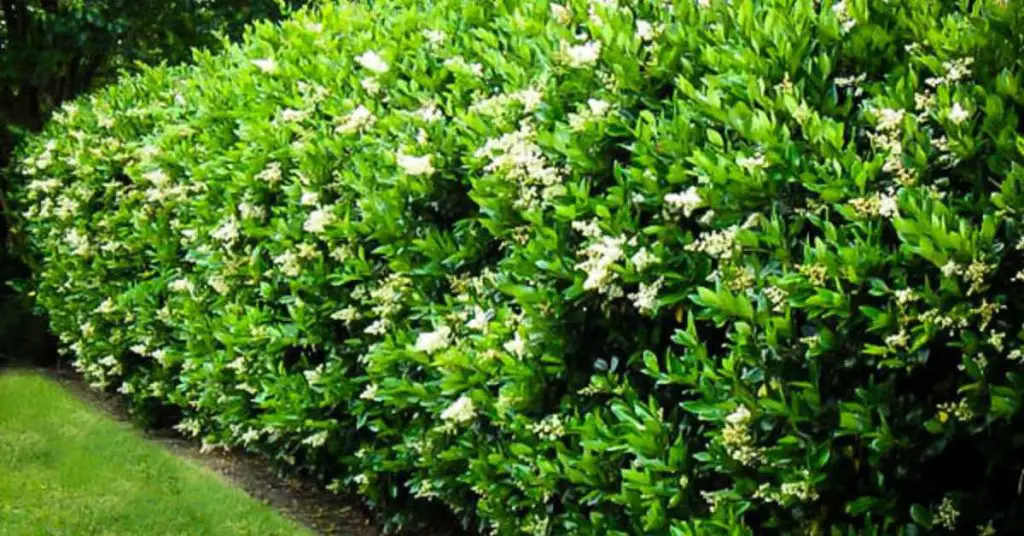
- Scientific Name: Ligustrum japonicum ‘Texanum’
- Expected Height: Up to 8-10 feet
- Expected Width: 4-6 feet
- Rate of Growth: Fast
- Sun Requirement: Full sun to partial shade
- Ideal Growing Zones: 7-10
Why This Is a Good Plant for Privacy: The Waxleaf Privet Hedge is an excellent choice for privacy screens due to its fast growth rate, allowing it to establish a dense barrier quickly. It thrives in a wide range of light conditions, from full sun to partial shade, making it adaptable to various garden settings.
This privet is particularly valued for its glossy evergreen leaves, which provide a year-round visual barrier. Its ability to withstand frequent pruning makes it easy to shape and maintain at the desired height and width, ensuring a neat and tidy appearance.
Furthermore, the Waxleaf Privet is resistant to many pests and diseases, which contributes to its durability and low maintenance needs. It’s ideally suited for USDA zones 7 through 10, making it a popular choice in many temperate climates for creating instant and effective privacy.
3. Common Purple Lilac
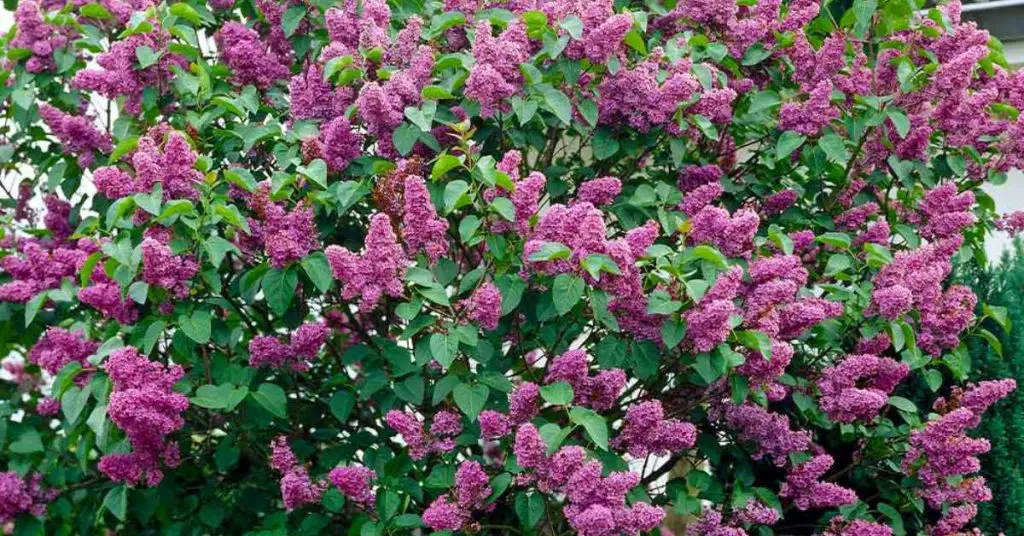
- Scientific Name: Syringa vulgaris
- Expected Height: Up to 8-15 feet
- Expected Width: 6-12 feet
- Rate of Growth: Moderate
- Sun Requirement: Full sun
- Ideal Growing Zones: 3-7
Why This Is a Good Plant for Privacy: The Common Purple Lilac is a classic choice for privacy screens, valued for its beauty and fragrance. While its growth rate is moderate compared to some other shrubs, it is still relatively fast for a tree, and it can quickly fill in to provide privacy.
The lush foliage and abundant purple flowers add visual appeal to any garden, making it a delightful choice for those seeking both privacy and aesthetics. It is well-suited for colder climates, thriving in USDA zones 3 to 7, and can tolerate a variety of soil types.
The fragrance of the blooms also adds a sensory element to your garden, making it a pleasant place to relax and enjoy the outdoors.
4. Lemon Lights Azalea Shrub
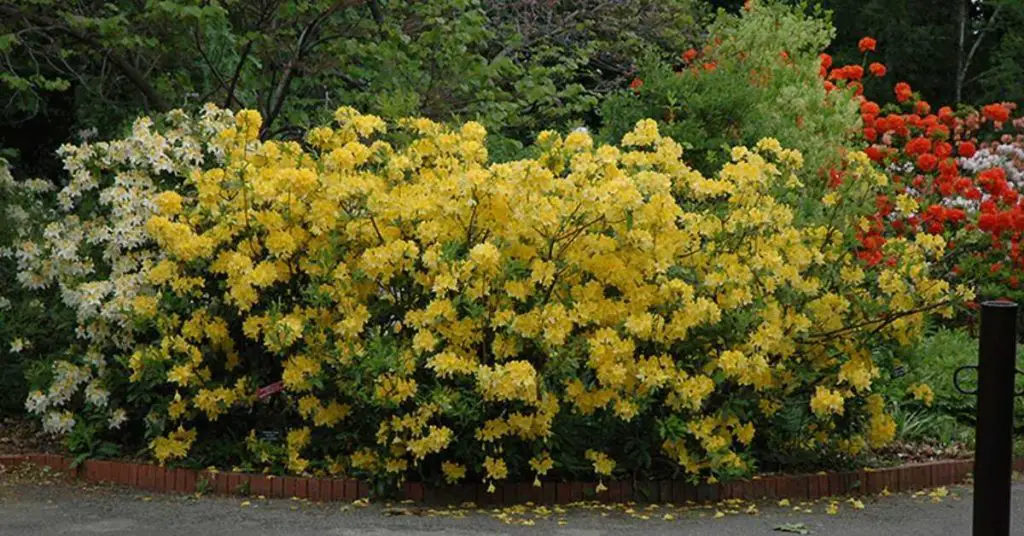
- Scientific Name: Rhododendron ‘Lemon Lights’
- Expected Height: Up to 4-5 feet
- Expected Width: 4-5 feet
- Rate of Growth: Moderate
- Sun Requirement: Partial shade
- Ideal Growing Zones: 4-8
Why This Is a Good Plant for Privacy: The Lemon Lights Azalea Shrub is a charming choice for privacy screens, offering both visual and olfactory delights. While not as tall as some other privacy plants, its dense, bushy growth habit makes it an effective screen at lower heights.
The shrub produces vibrant yellow flowers in spring, adding a cheerful pop of color to your garden. It prefers partial shade, making it suitable for areas with filtered sunlight or morning sun, and it thrives in USDA zones 4 to 8.
The Lemon Lights Azalea’s moderate growth rate allows for manageable maintenance and shaping, ensuring that it remains an attractive and functional privacy plant in your garden.
5. Oakleaf Hydrangea Shrub
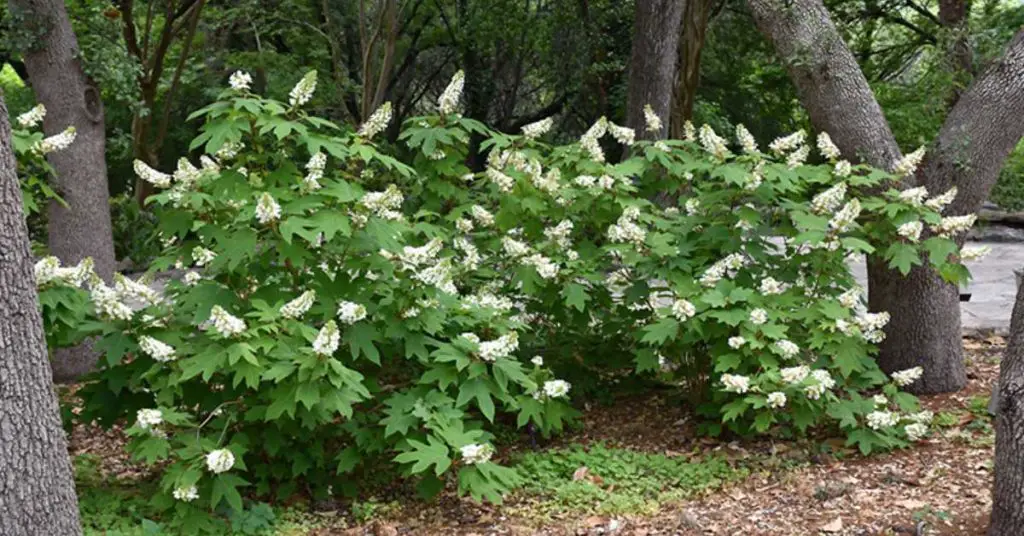
- Scientific Name: Hydrangea quercifolia
- Expected Height: Up to 4-6 feet
- Expected Width: 4-6 feet
- Rate of Growth: Moderate
- Sun Requirement: Partial shade to full shade
- Ideal Growing Zones: 5-9
Why This Is a Good Plant for Privacy: The Oakleaf Hydrangea Shrub is a unique and attractive option for privacy screens, prized for its large, oak-like leaves and cone-shaped flower clusters. While its height is relatively modest, its dense foliage and bushy growth make it effective at creating a visual barrier.
The shrub’s foliage turns a rich burgundy in the fall, adding seasonal interest to your garden. It thrives in partial to full shade, making it ideal for areas with limited sunlight, and it is well-suited for USDA zones 5 to 9.
It is relatively low-maintenance, requiring minimal pruning and care once established, making it a hassle-free choice for privacy landscaping.
6. Gulf Stream Heavenly Bamboo
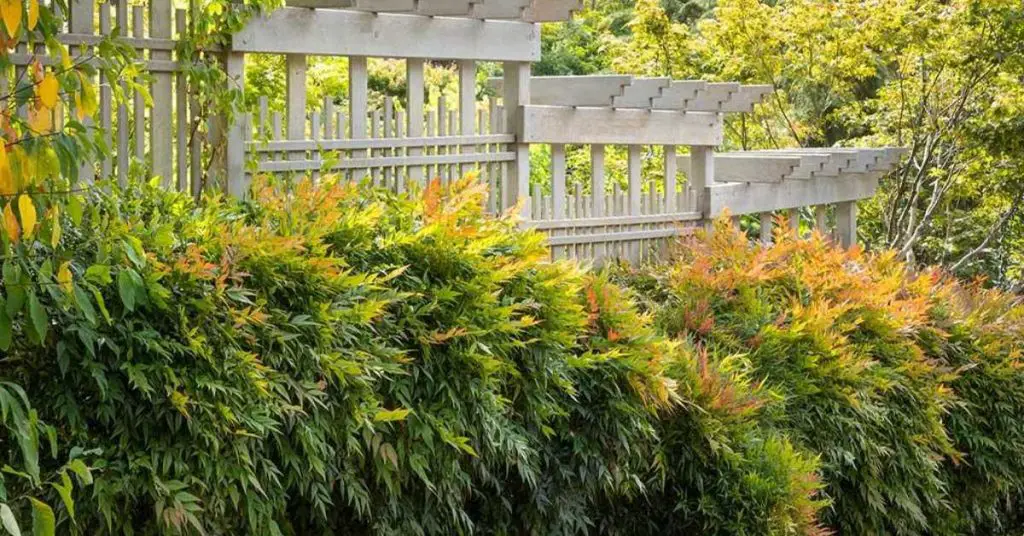
- Scientific Name: Nandina domestica ‘Gulf Stream’
- Expected Height: Up to 2-3 feet
- Expected Width: 2-3 feet
- Rate of Growth: Moderate
- Sun Requirement: Full sun to partial shade
- Ideal Growing Zones: 6-10
Why This Is a Good Plant for Privacy: The Gulf Stream Heavenly Bamboo is a compact and versatile shrub that is well-suited for creating privacy screens in smaller spaces. Despite its modest height, its dense growth habit and evergreen foliage make it effective at providing privacy.
The shrub’s foliage changes color throughout the year, starting with vibrant red new growth that matures to a lush green, adding visual interest to your garden. It thrives in full sun to partial shade, making it adaptable to different light conditions, and it is suitable for USDA zones 6 to 10.
The Gulf Stream Heavenly Bamboo is also relatively low-maintenance, requiring minimal pruning and care, making it a practical and attractive choice for privacy landscaping.
7. Lavender Rhododendron Shrub

- Scientific Name: Rhododendron ‘Blue Baron’
- Expected Height: Up to 4-6 feet
- Expected Width: 4-6 feet
- Rate of Growth: Moderate
- Sun Requirement: Partial shade
- Ideal Growing Zones: 5-8
Why This Is a Good Plant for Privacy: The Lavender Rhododendron Shrub, also known as ‘Blue Baron’, is a stunning choice for privacy screens, offering both visual appeal and versatility.
This rhododendron variety features large clusters of lavender-purple flowers in spring, adding a burst of color to your garden. Its dense, evergreen foliage provides year-round privacy and interest.
The shrub thrives in partial shade, making it suitable for areas with filtered sunlight, and it is well-suited for USDA zones 5 to 8.
The Lavender Rhododendron’s moderate growth rate allows for manageable maintenance and shaping, ensuring that it remains an attractive and functional privacy plant in your garden.
8. Arctic Willow
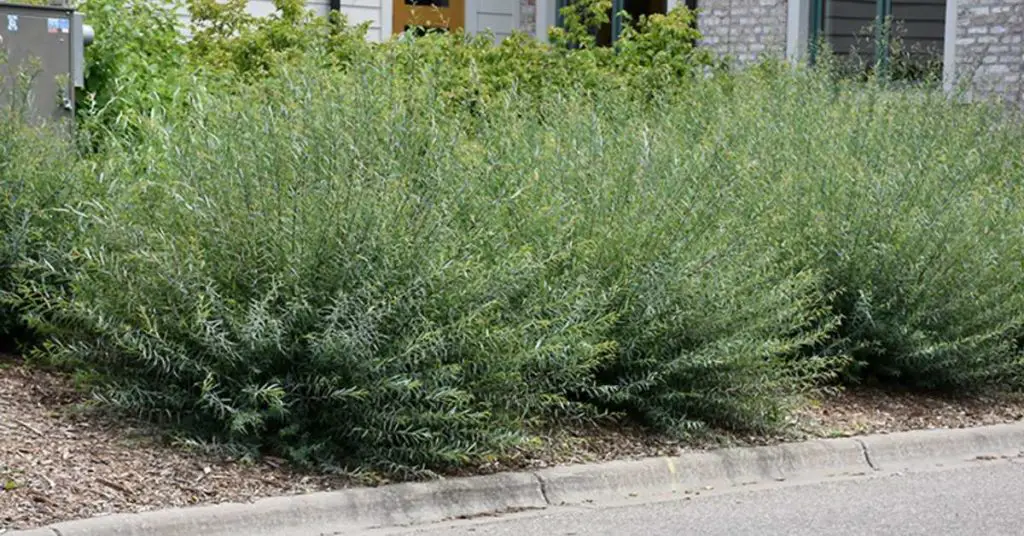
- Scientific Name: Salix purpurea ‘Nana’
- Expected Height: Up to 4-6 feet
- Expected Width: 4-6 feet
- Rate of Growth: Fast
- Sun Requirement: Full sun
- Ideal Growing Zones: 3-7
Why This Is a Good Plant for Privacy: The Arctic Willow, or Salix purpurea ‘Nana’, is a fast-growing shrub that is ideal for creating quick privacy screens. It features narrow, silvery leaves that provide a unique texture and color to your garden.
In the spring, it produces small, yellow catkins that add visual interest. The Arctic Willow thrives in full sun and is well-suited for USDA zones 3 to 7.
Its fast growth rate allows for rapid establishment of a privacy barrier, making it an excellent choice for those looking to create a secluded outdoor space quickly.
The shrub’s low maintenance requirements make it easy to care for, requiring minimal pruning and care once established.
9. Endless Summer Hydrangea Shrub
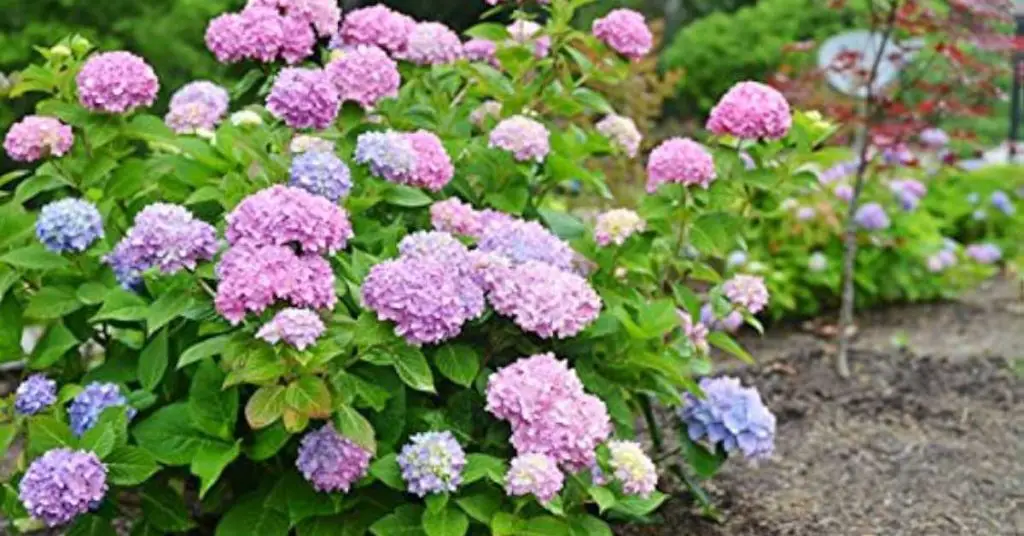
- Scientific Name: Hydrangea macrophylla ‘Endless Summer®’
- Expected Height: Up to 3-5 feet
- Expected Width: 3-5 feet
- Rate of Growth: Moderate
- Sun Requirement: Partial shade
- Ideal Growing Zones: 4-9
Why This Is a Good Plant for Privacy: The Endless Summer® Hydrangea Shrub is a popular choice for privacy screens, prized for its large, showy blooms that can last from early summer to fall.
This hydrangea variety features clusters of pink or blue flowers, depending on the soil pH, adding a burst of color to your garden.
Its dense, bushy growth habit makes it effective at creating a visual barrier, and it thrives in partial shade, making it suitable for areas with filtered sunlight.
The Endless Summer® Hydrangea is well-suited for USDA zones 4 to 9 and is relatively low-maintenance, requiring minimal pruning and care once established.
10. Camellia ‘Shi-Shi Gashira’ Shrub
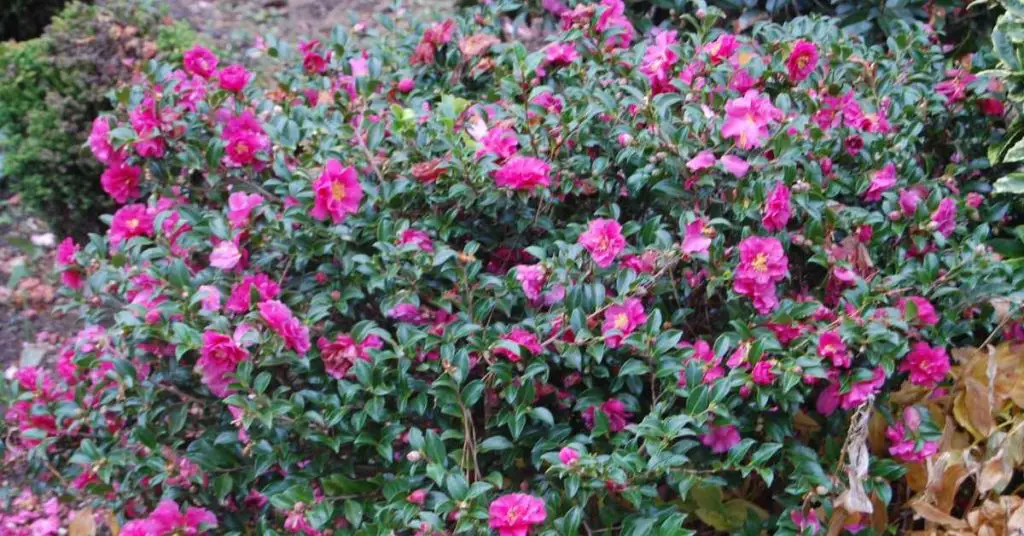
- cientific Name: Camellia sasanqua ‘Shi-Shi Gashira’
- Expected Height: Up to 4-6 feet
- Expected Width: 4-6 feet
- Rate of Growth: Moderate
- Sun Requirement: Partial shade
- Ideal Growing Zones: 7-9
Why This Is a Good Plant for Privacy: The Camellia ‘Shi-Shi Gashira’ Shrub is a compact and attractive option for privacy screens, known for its beautiful, rose-like flowers and glossy evergreen foliage.
This camellia variety features deep pink, semi-double flowers that bloom profusely in the fall and winter, adding color and interest to your garden during the colder months.
Its dense growth habit and moderate growth rate make it effective at creating a visual barrier, and it thrives in partial shade, making it suitable for areas with filtered sunlight.
The Camellia ‘Shi-Shi Gashira’ is well-suited for USDA zones 7 to 9 and is relatively low-maintenance, requiring minimal pruning and care once established.
11. Tri-Color Dappled Willow
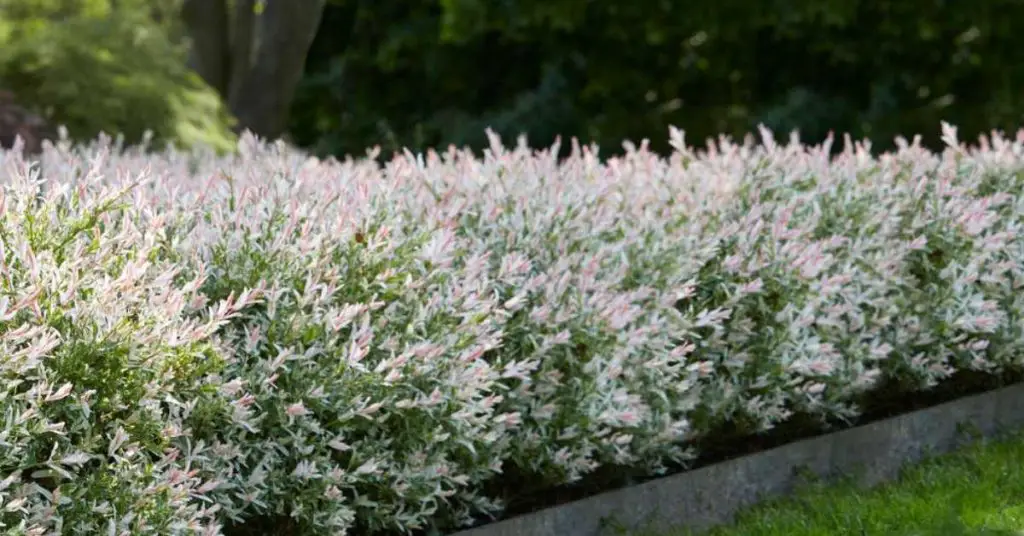
- Scientific Name: Salix integra ‘Hakuro-nishiki’
- Expected Height: Up to 6-10 feet
- Expected Width: 4-6 feet
- Rate of Growth: Fast
- Sun Requirement: Full sun to partial shade
- Ideal Growing Zones: 4-9
Why This Is a Good Plant for Privacy: The Tri-Color Dappled Willow, or Salix integra ‘Hakuro-nishiki’, is a fast-growing shrub that is prized for its colorful foliage and rapid growth rate, making it an excellent choice for creating quick privacy screens.
This willow variety features leaves that are variegated with shades of pink, white, and green, adding a bright and cheerful element to your garden.
Its dense, bushy growth habit and fast growth rate allow for rapid establishment of a privacy barrier, and it thrives in full sun to partial shade, making it adaptable to different light conditions.
The Tri-Color Dappled Willow is well-suited for USDA zones 4 to 9 and is relatively low-maintenance, requiring minimal pruning and care once established.
Top Fastest Growing Trees for Privacy
Trees are excellent for achieving higher privacy due to their tall stature. They provide a taller barrier against prying eyes and can quickly transform the feel of your outdoor space. Here are some of the top fast-growing trees that are excellent choices for creating privacy:
12. White Pussy Willow
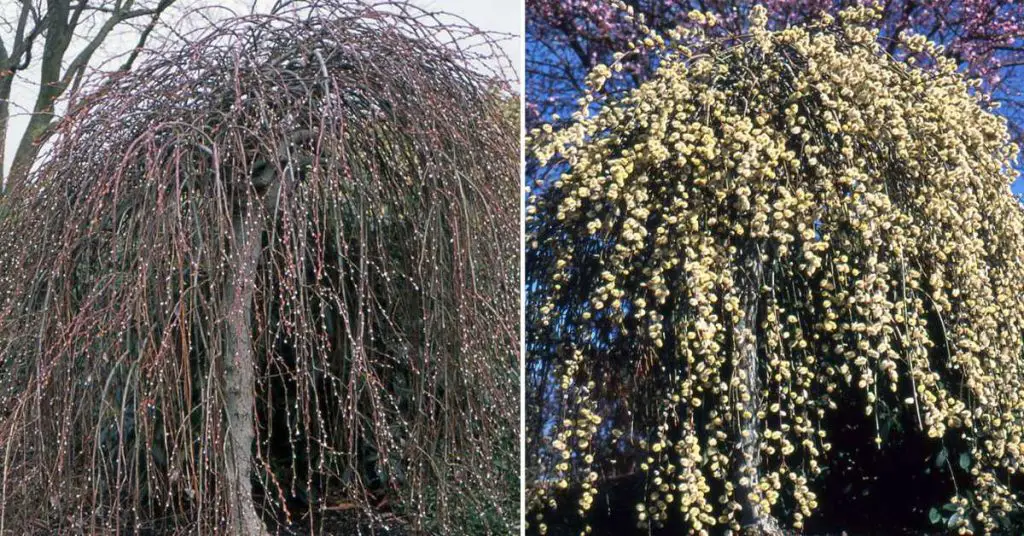
- Scientific Name: Salix caprea ‘Kilmarnock’
- Expected Height: Up to 4-6 feet
- Expected Width: 4-6 feet
- Rate of Growth: Fast
- Sun Requirement: Full sun to partial shade
- Ideal Growing Zones: 4-8
Why This Is a Good Plant for Privacy: The White Pussy Willow, or Salix caprea ‘Kilmarnock’, is a fast-growing shrub known for its striking white catkins that appear in early spring. This willow variety features a compact, weeping growth habit, making it ideal for smaller gardens or as an accent plant in larger landscapes.
Its dense foliage and rapid growth rate allow for quick establishment of a privacy screen, and it thrives in full sun to partial shade, making it adaptable to various light conditions.
The White Pussy Willow is well-suited for USDA zones 4 to 8 and is relatively low-maintenance, requiring minimal pruning and care once established.
These shrubs represent just a few of the many options available for creating a fast-growing, beautiful privacy screen in your yard. Each has its unique qualities and benefits, so consider your specific needs and environment when choosing the right ones for your garden.
13. Austree Willow Hybrid Tree
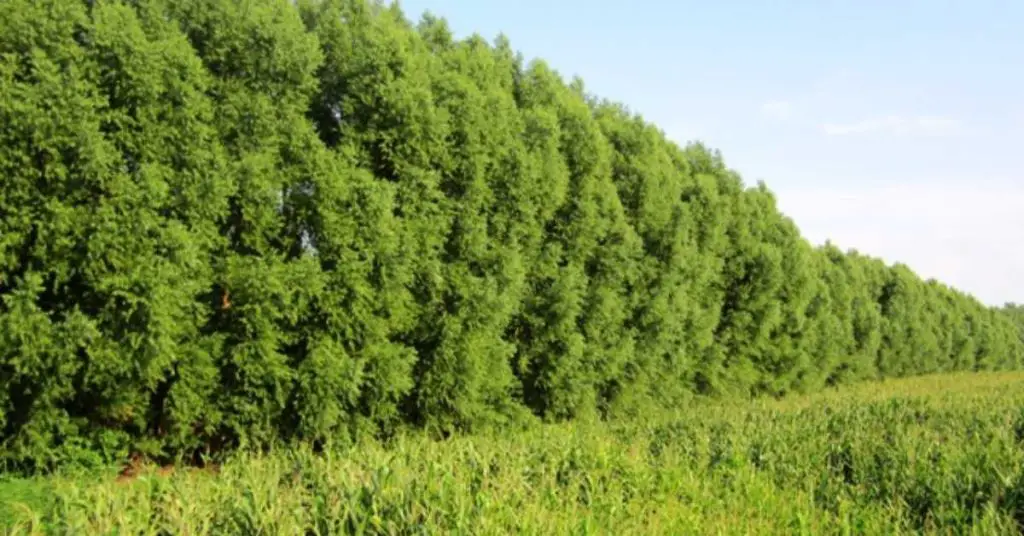
- Scientific Name: Salix matsudana x alba ‘Austree’
- Expected Height: Up to 30-40 feet
- Expected Width: 10-15 feet
- Rate of Growth: Fast
- Sun Requirement: Full sun to partial shade
- Ideal Growing Zones: 2-9
Why This Is a Good Tree for Privacy: The Austree Willow Hybrid is a popular choice for creating fast-growing privacy screens. It features slender, upright branches that quickly fill in to form a dense canopy, providing privacy and shade.
This tree is known for its rapid growth rate, making it ideal for homeowners looking to establish a privacy barrier quickly. It thrives in full sun to partial shade and is adaptable to a variety of soil types.
The Austree Willow Hybrid is well-suited for USDA zones 2 to 9 and is relatively low-maintenance, requiring minimal pruning and care once established.
14. Nellie Stevens Holly
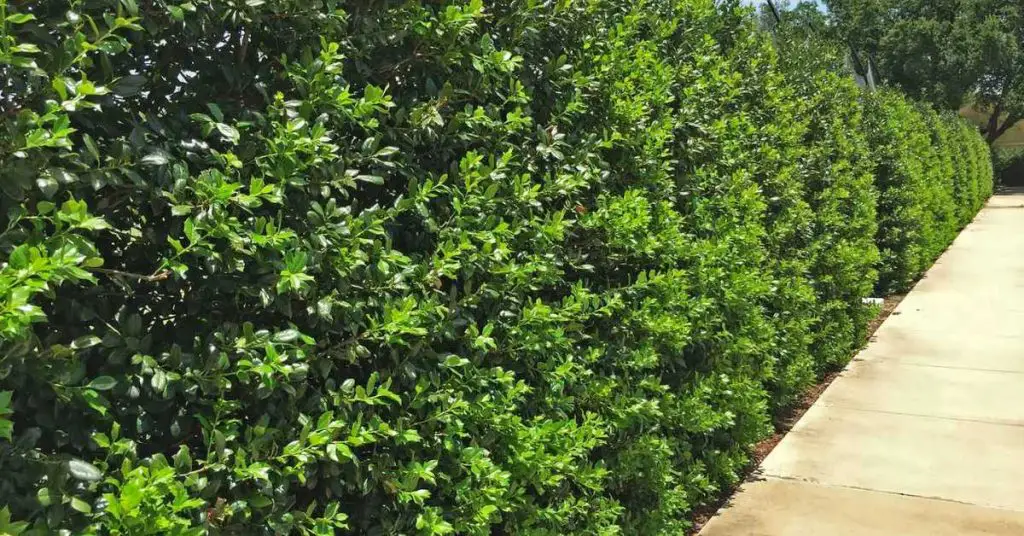
- Scientific Name: Ilex x ‘Nellie R. Stevens’
- Expected Height: Up to 15-25 feet
- Expected Width: 8-12 feet
- Rate of Growth: Fast
- Sun Requirement: Full sun to partial shade
- Ideal Growing Zones: 6-9
Why This Is a Good Tree for Privacy: The Nellie Stevens Holly is a fast-growing evergreen tree that is well-suited for creating privacy screens. It features dense, glossy foliage and a pyramidal growth habit, making it an attractive option for both privacy and landscaping.
This holly variety is known for its rapid growth rate, quickly reaching heights of 15 to 25 feet. It thrives in full sun to partial shade and is adaptable to various soil types.
The Nellie Stevens Holly is well-suited for USDA zones 6 to 9 and is relatively low-maintenance, requiring minimal pruning and care once established.
15. Leyland Cypress Tree
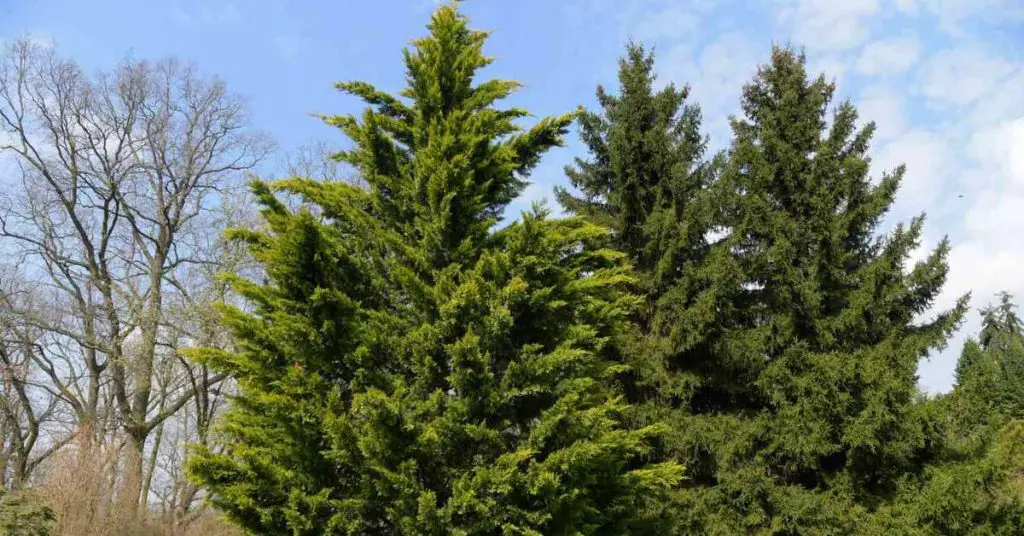
- Scientific Name: x Cupressocyparis leylandii
- Expected Height: Up to 60-70 feet
- Expected Width: 15-20 feet
- Rate of Growth: Fast
- Sun Requirement: Full sun
- Ideal Growing Zones: 6-10
Why This Is a Good Tree for Privacy: The Leyland Cypress is a popular choice for creating fast-growing privacy screens due to its rapid growth rate and dense foliage. It features a tall, columnar shape that quickly fills in to form a solid barrier.
This cypress variety is known for its ability to grow in a variety of soil types and climates, making it adaptable to different garden settings. It thrives in full sun and is well-suited for USDA zones 6 to 10.
The Leyland Cypress requires regular pruning to maintain its shape and density, but it is relatively low-maintenance overall, making it a practical choice for homeowners seeking quick privacy solutions.
16. Edible Bamboo Plant
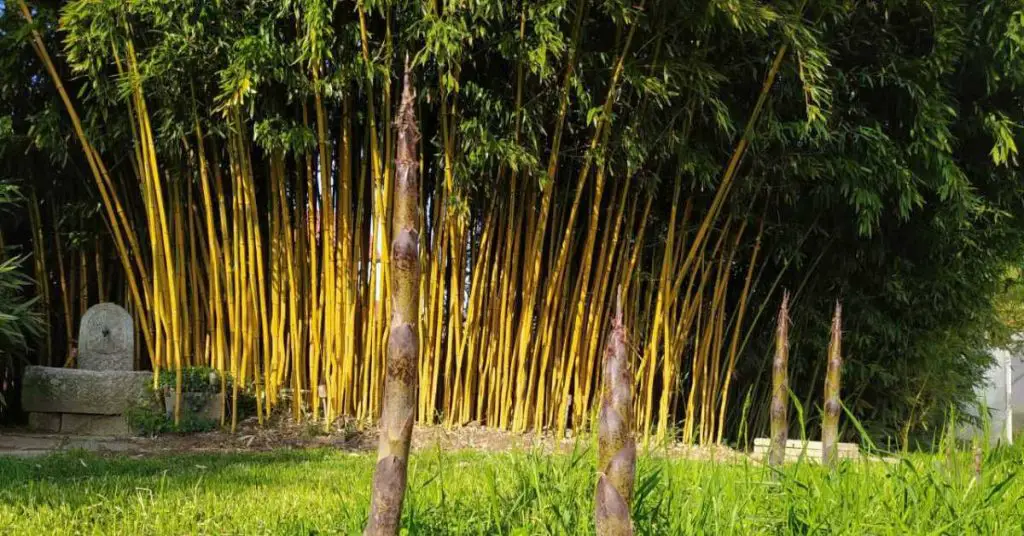
- Scientific Name: Phyllostachys edulis
- Expected Height: Up to 20-30 feet
- Expected Width: 10-15 feet
- Rate of Growth: Fast
- Sun Requirement: Full sun to partial shade
- Ideal Growing Zones: 7-10
Why This Is a Good Plant for Privacy: Edible Bamboo is a fast-growing bamboo variety that is not only useful for creating privacy screens but also provides a sustainable source of food. It features tall, upright canes with edible shoots that can be harvested for culinary use.
This bamboo variety is known for its rapid growth rate, quickly reaching heights of 20 to 30 feet. It thrives in full sun to partial shade and is adaptable to a variety of soil types.
Edible Bamboo is well-suited for USDA zones 7 to 10 and is relatively low-maintenance, requiring minimal pruning and care once established.
17. Thuja Green Giant
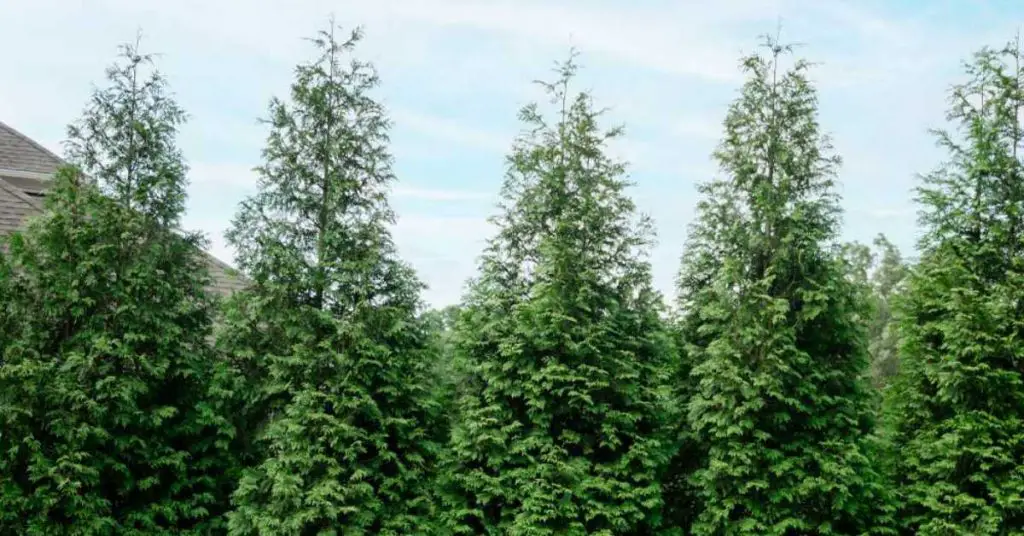
- Scientific Name: Thuja standishii x plicata ‘Green Giant’
- Expected Height: Up to 30-40 feet
- Expected Width: 10-15 feet
- Rate of Growth: Fast
- Sun Requirement: Full sun to partial shade
- Ideal Growing Zones: 5-9
Why This Is a Good Plant for Privacy: Thuja Green Giant is a fast-growing evergreen tree that is ideal for creating privacy screens. It features dense, lush foliage and a tall, pyramidal shape that quickly fills in to form a solid barrier.
This arborvitae variety is known for its rapid growth rate, quickly reaching heights of 30 to 40 feet. It thrives in full sun to partial shade and is adaptable to various soil types.
Thuja Green Giant is well-suited for USDA zones 5 to 9 and is relatively low-maintenance, requiring minimal pruning and care once established.
18. Full Speed A Hedge American Pillar Arborvitae
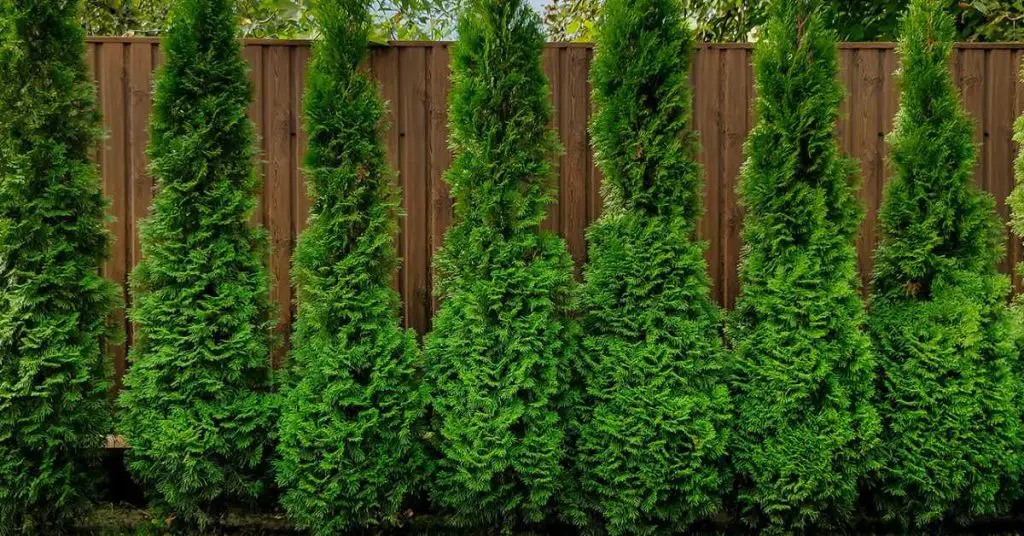
- Scientific Name: Thuja occidentalis ‘American Pillar’
- Expected Height: Up to 20-30 feet
- Expected Width: 4-5 feet
- Rate of Growth: Fast
- Sun Requirement: Full sun to partial shade
- Ideal Growing Zones: 3-8
Why This Is a Good Plant for Privacy: Full Speed A Hedge® American Pillar Arborvitae is a fast-growing arborvitae variety that is ideal for creating tall, narrow privacy screens.
It features a columnar growth habit, making it a space-saving option for smaller gardens or along property lines. This arborvitae variety is known for its rapid growth rate, quickly reaching heights of 20 to 30 feet.
It thrives in full sun to partial shade and is adaptable to a variety of soil types. Full Speed A Hedge® American Pillar Arborvitae is well-suited for USDA zones 3 to 8 and is relatively low-maintenance, requiring minimal pruning and care once established.
19. Lombardy Poplar Tree
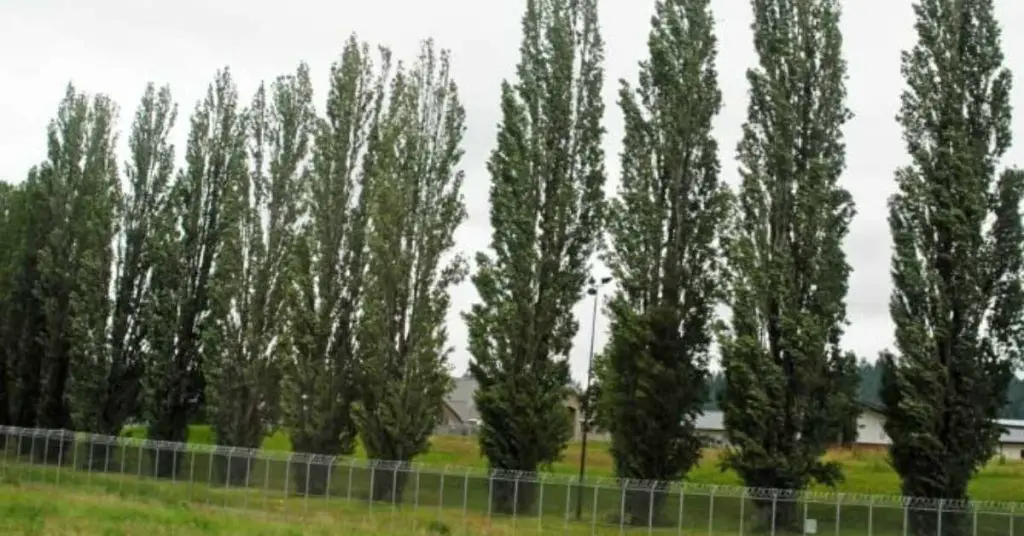
- Scientific Name: Populus nigra ‘Italica’
- Expected Height: Up to 40-60 feet
- Expected Width: 10-15 feet
- Rate of Growth: Fast
- Sun Requirement: Full sun
- Ideal Growing Zones: 3-9
Why This Is a Good Plant for Privacy: The Lombardy Poplar is a fast-growing tree that is prized for its tall, narrow growth habit, making it an excellent choice for creating privacy screens in urban or narrow spaces.
It features a distinctive columnar shape and vibrant green foliage that adds visual interest to your garden. This poplar variety is known for its rapid growth rate, quickly reaching heights of 40 to 60 feet. It thrives in full sun and is adaptable to various soil types.
The Lombardy Poplar is well-suited for USDA zones 3 to 9 and is relatively low-maintenance, requiring minimal pruning and care once established.
20. Eastern White Pine Tree
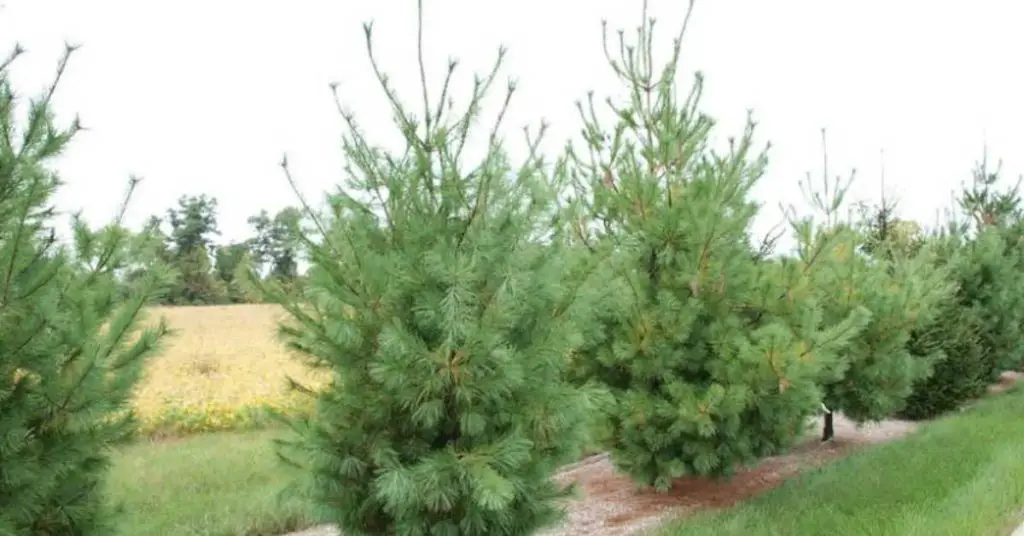
- Scientific Name: Pinus strobus
- Expected Height: Up to 50-80 feet
- Expected Width: 20-40 feet
- Rate of Growth: Fast
- Sun Requirement: Full sun to partial shade
- Ideal Growing Zones: 3-8
Why This Is a Good Plant for Privacy: The Eastern White Pine is a fast-growing evergreen tree that is ideal for creating tall, dense privacy screens. It features soft, feathery needles and a pyramidal growth habit that quickly fills in to form a solid barrier.
This pine variety is known for its rapid growth rate, quickly reaching heights of 50 to 80 feet. It thrives in full sun to partial shade and is adaptable to various soil types.
The Eastern White Pine is well-suited for USDA zones 3 to 8 and is relatively low-maintenance, requiring minimal pruning and care once established.
21. Moonglow Juniper
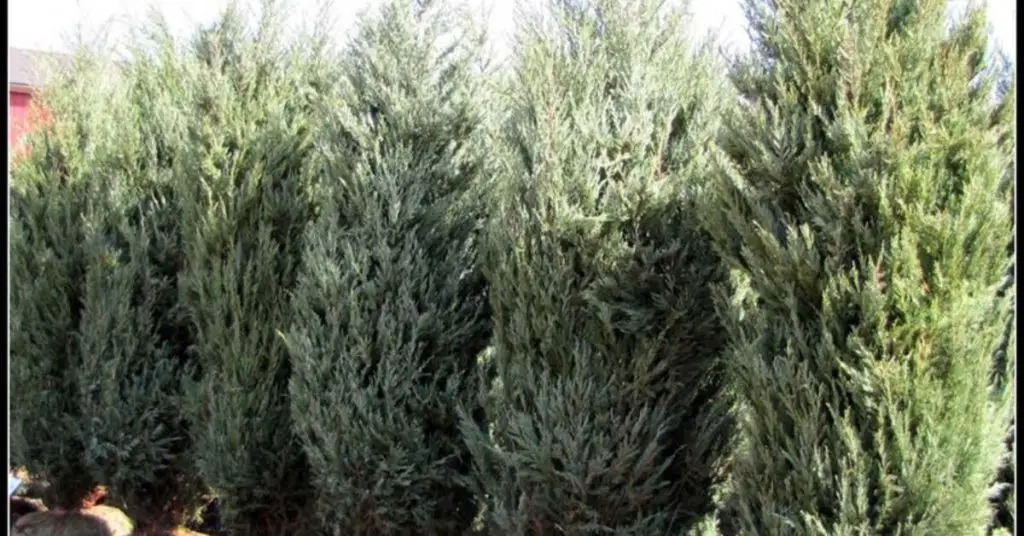
- Scientific Name: Juniperus scopulorum ‘Moonglow’
- Expected Height: Up to 6-8 feet
- Expected Width: 4-6 feet
- Rate of Growth: Moderate
- Sun Requirement: Full sun
- Ideal Growing Zones: 4-9
Why This Is a Good Plant for Privacy: The Moonglow Juniper is a compact evergreen shrub that is ideal for creating privacy screens in smaller spaces. It features dense, silvery-blue foliage that retains its color year-round, adding beauty and interest to your garden.
This juniper variety has a moderate growth rate, reaching heights of 6 to 8 feet. It thrives in full sun and is tolerant of drought and poor soil conditions.
The Moonglow Juniper is well-suited for USDA zones 4 to 9 and is relatively low-maintenance, requiring minimal pruning and care once established.
22. Robin Red Holly Tree
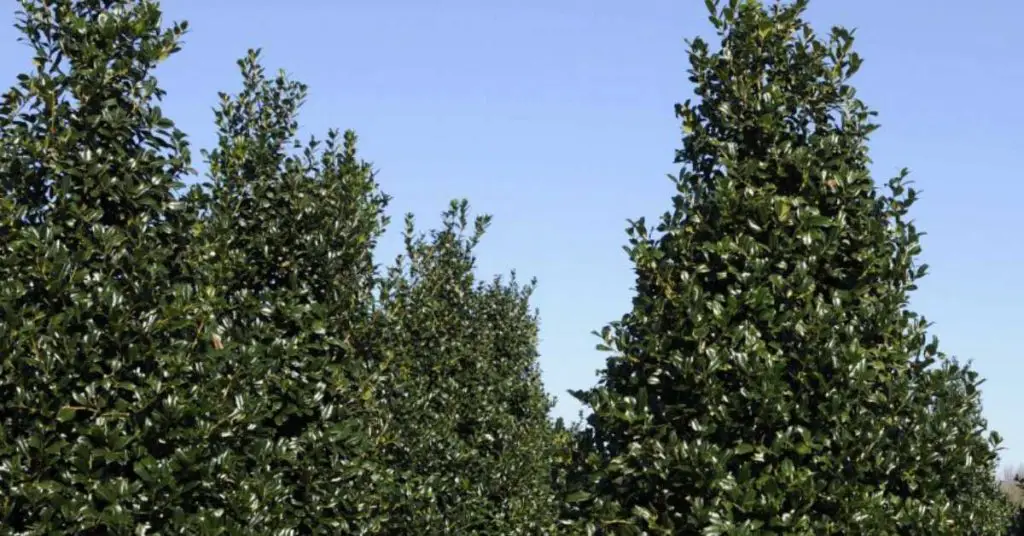
- Scientific Name: Ilex x ‘Robin’
- Expected Height: Up to 15-20 feet
- Expected Width: 8-10 feet
- Rate of Growth: Moderate
- Sun Requirement: Full sun to partial shade
- Ideal Growing Zones: 6-9
Why This Is a Good Plant for Privacy: The Robin Red Holly is a versatile evergreen tree that is well-suited for creating privacy screens. It features glossy, dark green foliage and bright red berries in the winter, adding color and interest to your garden.
This holly variety has a moderate growth rate, reaching heights of 15 to 20 feet. It thrives in full sun to partial shade and is adaptable to a variety of soil types.
The Robin Red Holly is well-suited for USDA zones 6 to 9 and is relatively low-maintenance, requiring minimal pruning and care once established.
23. Canadian Hemlock
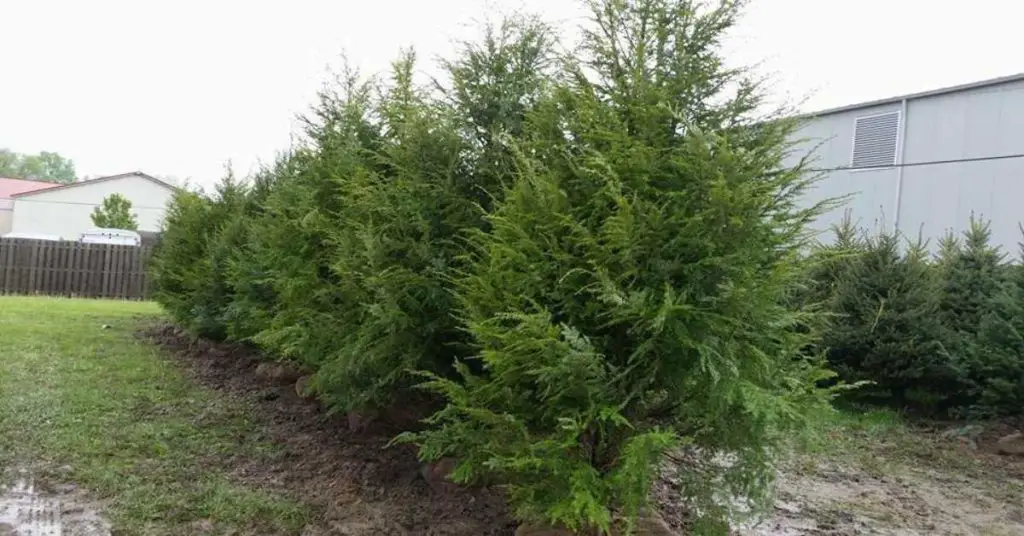
- Scientific Name: Tsuga canadensis
- Expected Height: Up to 40-70 feet
- Expected Width: 25-35 feet
- Rate of Growth: Moderate
- Sun Requirement: Full sun to partial shade
- Ideal Growing Zones: 3-7
Why This Is a Good Plant for Privacy: The Canadian Hemlock is a majestic evergreen tree that is ideal for creating tall, dense privacy screens. It features soft, feathery foliage and a graceful, pyramidal shape that adds elegance to your garden.
This hemlock variety has a moderate growth rate, reaching heights of 40 to 70 feet. It thrives in full sun to partial shade and is tolerant of a variety of soil types.
The Canadian Hemlock is well-suited for USDA zones 3 to 7 and is relatively low-maintenance, requiring minimal pruning and care once established.
24. Dawn Redwood Tree
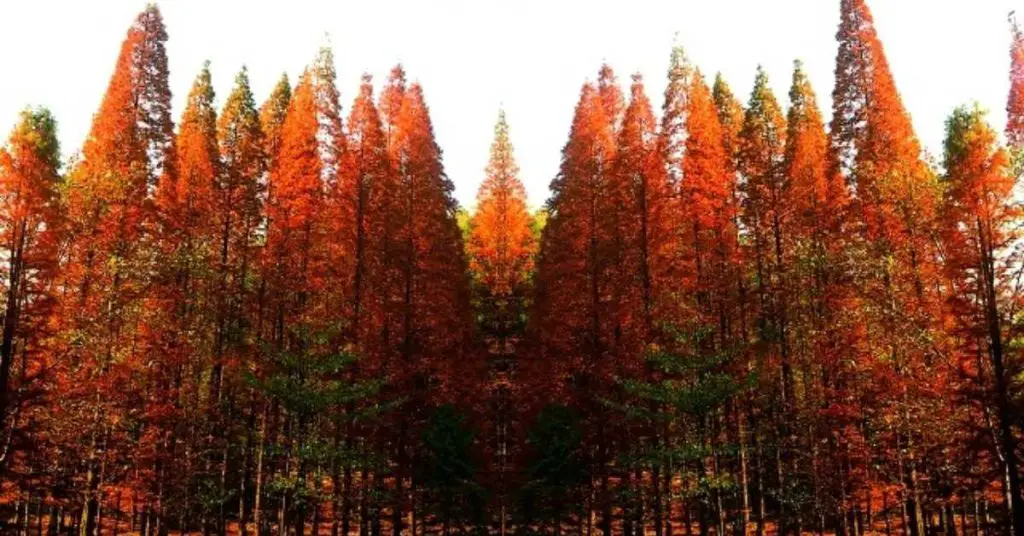
- Scientific Name: Metasequoia glyptostroboides
- Expected Height: Up to 70-100 feet
- Expected Width: 20-30 feet
- Rate of Growth: Fast
- Sun Requirement: Full sun to partial shade
- Ideal Growing Zones: 4-8
Why This Is a Good Plant for Privacy: The Dawn Redwood is a fast-growing deciduous tree that is ideal for creating tall, dense privacy screens. It features feathery, fern-like foliage that turns a beautiful coppery-bronze color in the fall, adding seasonal interest to your garden.
This redwood variety has a fast growth rate, reaching heights of 70 to 100 feet. It thrives in full sun to partial shade and is tolerant of wet soil conditions.
The Dawn Redwood is well-suited for USDA zones 4 to 8 and is relatively low-maintenance, requiring minimal pruning and care once established.
25. Vanderwolf’s Pyramid Limber Pine
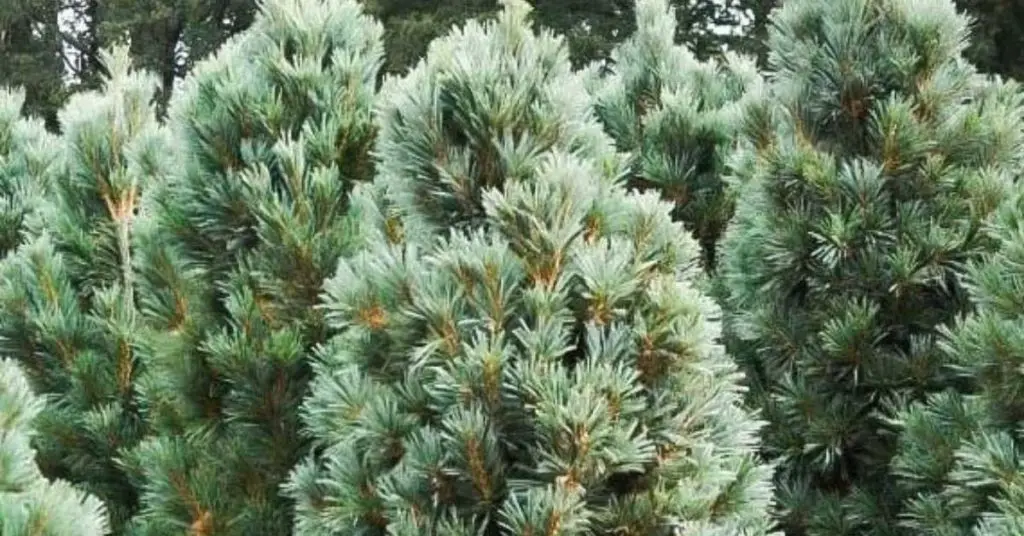
- Scientific Name: Pinus flexilis ‘Vanderwolf’s Pyramid’
- Expected Height: Up to 20-30 feet
- Expected Width: 10-15 feet
- Rate of Growth: Slow to moderate
- Sun Requirement: Full sun
- Ideal Growing Zones: 4-7
Why This Is a Good Plant for Privacy: Vanderwolf’s Pyramid Limber Pine is a slow to moderate-growing evergreen tree that is ideal for creating dense privacy screens. It features dense, blue-green needles and a pyramidal shape that adds structure and beauty to your garden.
This pine variety has a slow to moderate growth rate, reaching heights of 20 to 30 feet. It thrives in full sun and is tolerant of a variety of soil types.
Vanderwolf’s Pyramid Limber Pine is well-suited for USDA zones 4 to 7 and is relatively low-maintenance, requiring minimal pruning and care once established.
26. White Spruce Tree
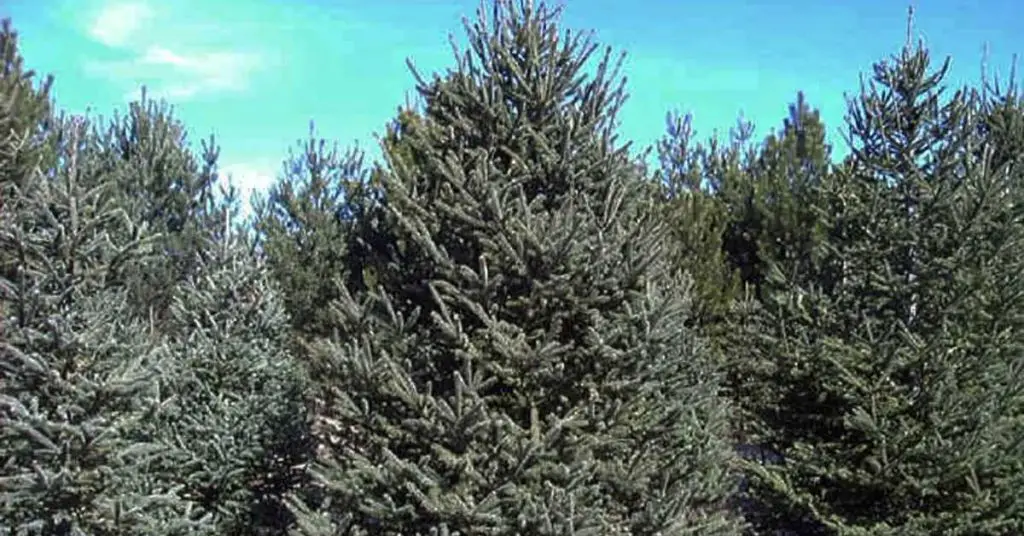
- Scientific Name: Picea glauca
- Expected Height: Up to 40-60 feet
- Expected Width: 10-20 feet
- Rate of Growth: Slow to moderate
- Sun Requirement: Full sun
- Ideal Growing Zones: 2-6
Why This Is a Good Plant for Privacy: The White Spruce is a slow to moderate-growing evergreen tree that is ideal for creating dense privacy screens. It features dense, blue-green foliage and a conical shape that adds a classic look to your garden.
This spruce variety has a slow to moderate growth rate, reaching heights of 40 to 60 feet. It thrives in full sun and is tolerant of a variety of soil types.
The White Spruce is well-suited for USDA zones 2 to 6 and is relatively low-maintenance, requiring minimal pruning and care once established.
27. Golden Bamboo
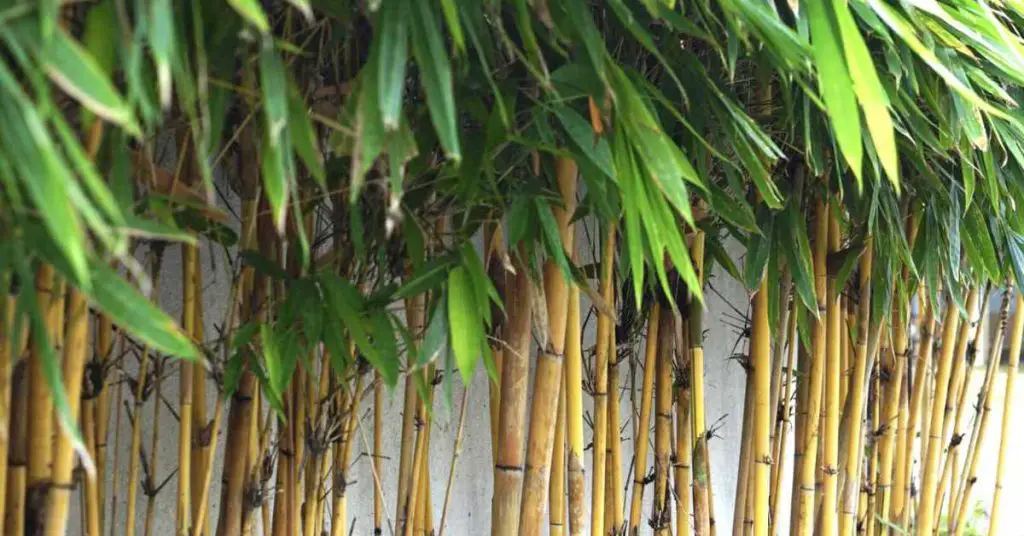
- Scientific Name: Phyllostachys aurea
- Expected Height: Up to 20-25 feet
- Expected Width: 10-12 feet
- Rate of Growth: Fast
- Sun Requirement: Full sun to partial shade
- Ideal Growing Zones: 7-10
Why This Is a Good Plant for Privacy: Golden Bamboo is a fast-growing bamboo variety that is ideal for creating dense privacy screens. It features tall, upright canes with bright green foliage, adding a tropical feel to your garden.
This bamboo variety has a fast growth rate, quickly reaching heights of 20 to 25 feet. It thrives in full sun to partial shade and is tolerant of a variety of soil types.
Golden Bamboo is well-suited for USDA zones 7 to 10 and is relatively low-maintenance, requiring minimal pruning and care once established.
28. Black Bamboo
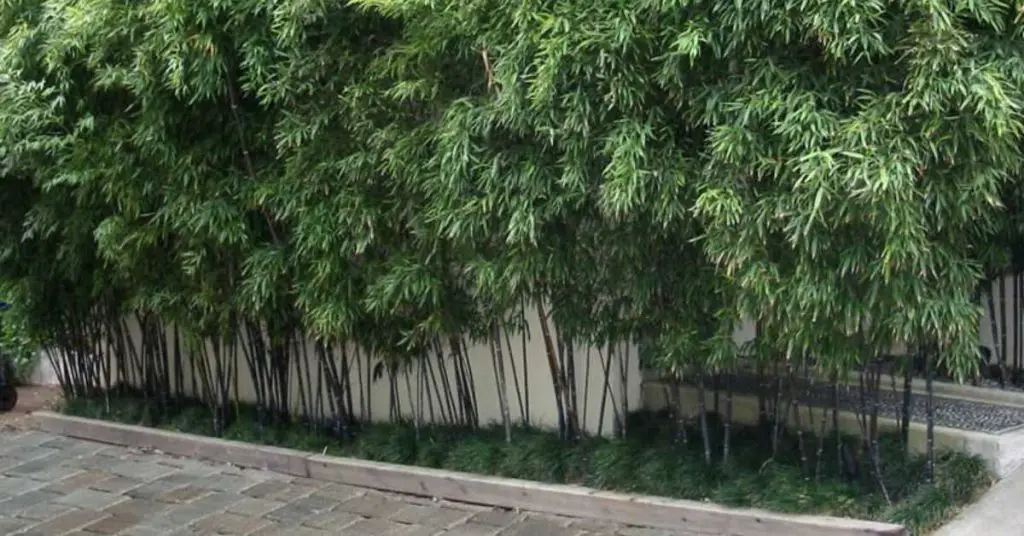
- Scientific Name: Phyllostachys nigra
- Expected Height: Up to 15-25 feet
- Expected Width: 6-10 feet
- Rate of Growth: Fast
- Sun Requirement: Full sun to partial shade
- Ideal Growing Zones: 7-10
Why This Is a Good Plant for Privacy: Black Bamboo is a fast-growing bamboo variety that is prized for its striking black canes and lush green foliage. It is ideal for creating dense privacy screens with a unique and dramatic look.
This bamboo variety has a fast growth rate, quickly reaching heights of 15 to 25 feet. It thrives in full sun to partial shade and is tolerant of a variety of soil types.
Black Bamboo is well-suited for USDA zones 7 to 10 and is relatively low-maintenance, requiring minimal pruning and care once established.
29. Multiplex Bamboo
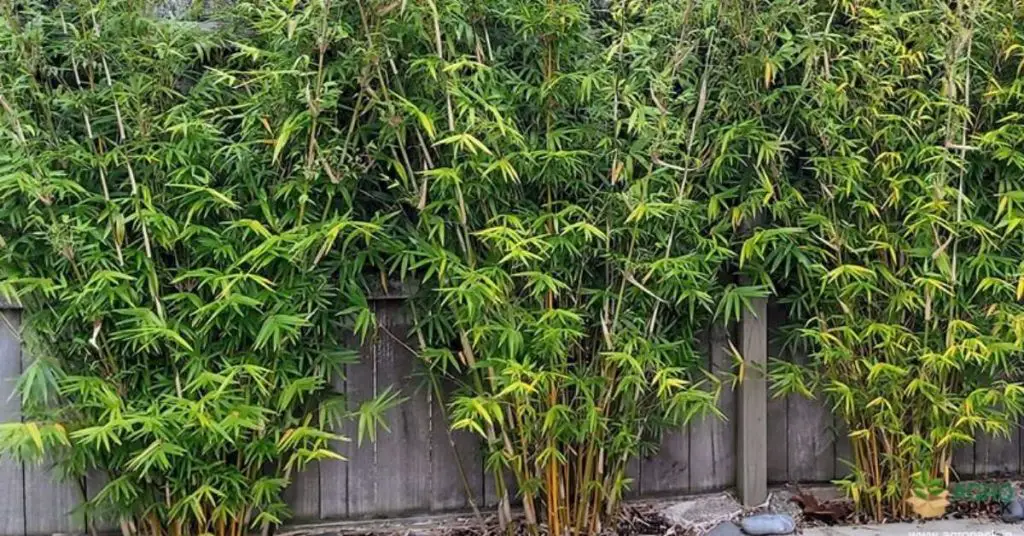
- Scientific Name: Bambusa multiplex
- Expected Height: Up to 15-25 feet
- Expected Width: 5-10 feet
- Rate of Growth: Fast
- Sun Requirement: Full sun to partial shade
- Ideal Growing Zones: 8-11
Why This Is a Good Plant for Privacy: Multiplex Bamboo is a fast-growing bamboo variety that is ideal for creating dense privacy screens. It features tall, slender canes with dense foliage, providing a lush and tropical look to your garden.
This bamboo variety has a fast growth rate, quickly reaching heights of 15 to 25 feet. It thrives in full sun to partial shade and is tolerant of a variety of soil types.
Multiplex Bamboo is well-suited for USDA zones 8 to 11 and is relatively low-maintenance, requiring minimal pruning and care once established.
30. Blue Cloak White Fir Tree
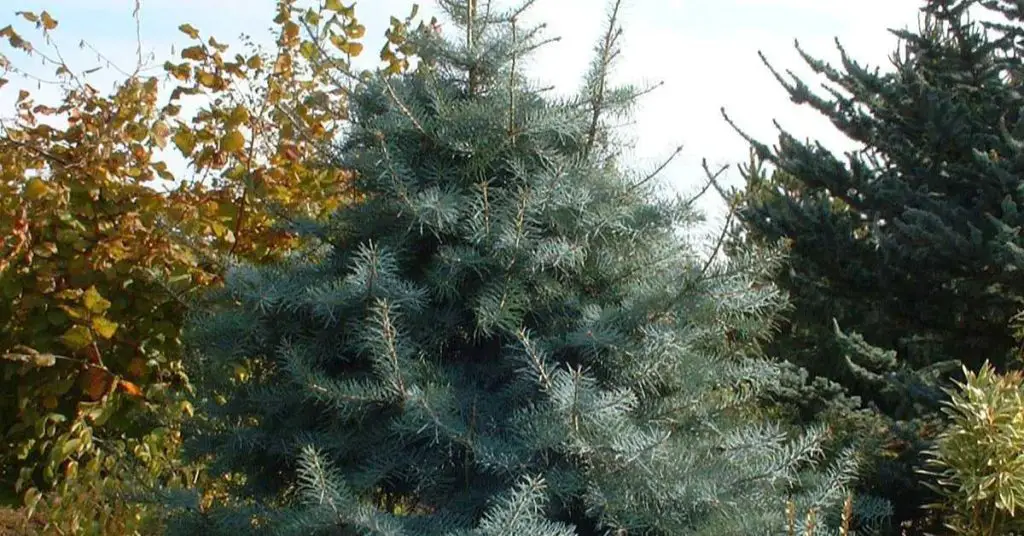
- Scientific Name: Abies concolor ‘Blue Cloak’
- Expected Height: Up to 10-15 feet
- Expected Width: 4-6 feet
- Rate of Growth: Slow to moderate
- Sun Requirement: Full sun to partial shade
- Ideal Growing Zones: 4-7
Why This Is a Good Plant for Privacy: Blue Cloak White Fir is a compact evergreen tree that is ideal for creating low, dense privacy screens. It features silvery-blue needles and a conical shape, adding a touch of elegance to your garden.
This fir variety has a slow to moderate growth rate, reaching heights of 10 to 15 feet. It thrives in full sun to partial shade and is tolerant of a variety of soil types.
Blue Cloak White Fir is well-suited for USDA zones 4 to 7 and is relatively low-maintenance, requiring minimal pruning and care once established.
31. Brodie Eastern Red Cedar Tree
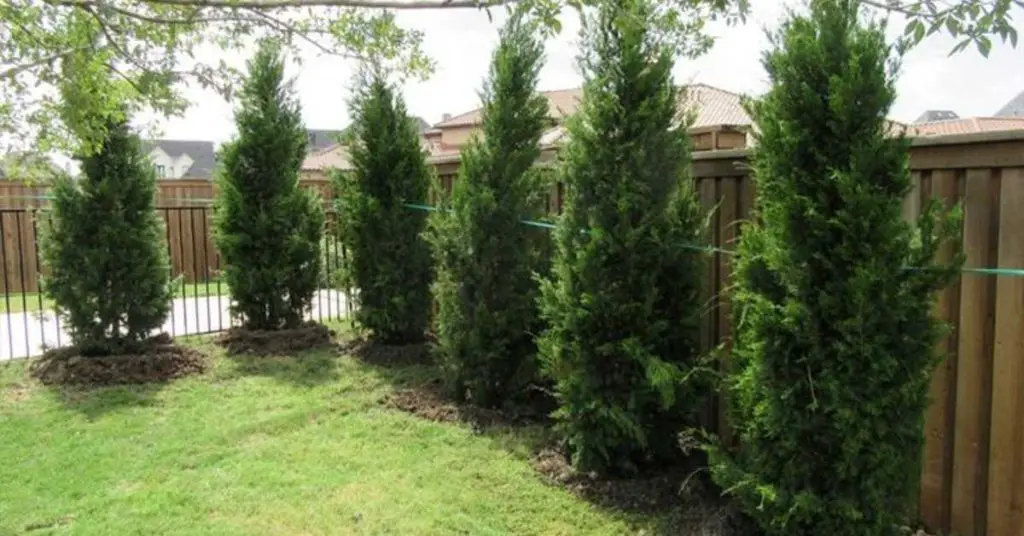
- Scientific Name: Juniperus virginiana ‘Brodie’
- Expected Height: Up to 10-15 feet
- Expected Width: 5-8 feet
- Rate of Growth: Slow to moderate
- Sun Requirement: Full sun
- Ideal Growing Zones: 3-9
Why This Is a Good Plant for Privacy: The Brodie Eastern Red Cedar is a compact evergreen tree that is ideal for creating low, dense privacy screens.
It features dense, blue-green foliage and a pyramidal shape, adding a classic look to your garden. This cedar variety has a slow to moderate growth rate, reaching heights of 10 to 15 feet. It thrives in full sun and is tolerant of a variety of soil types.
The Brodie Eastern Red Cedar is well-suited for USDA zones 3 to 9 and is relatively low-maintenance, requiring minimal pruning and care once established.
These trees are excellent for creating a natural, high-reaching privacy screen in your yard. Each offers unique characteristics that can cater to different landscaping needs and personal tastes, helping you to craft a secluded and beautiful outdoor environment.
What to Consider When Choosing Fast Growing Trees and Shrubs for Privacy?
When deciding on the best trees and shrubs for your privacy needs, there are several important factors to consider. These considerations will help ensure that you choose plants that will thrive in your specific environment and meet your privacy requirements effectively.
Climate Compatibility
Match Plants to Your Climate: Not all plants thrive in every climate. Select species that are well-suited to your area’s temperature range, precipitation levels, and seasonal changes. This ensures that your privacy plants grow strong and healthy.
Soil Type
Understand Your Soil Conditions: The type of soil in your yard can greatly affect the growth of plants. Some trees and shrubs prefer sandy soil, while others thrive in clay or loam. Check the soil drainage and pH level, and choose plants that will grow well in your soil conditions.
Water Needs
Consider Water Availability: Different plants require different amounts of water. Some need frequent watering, while others are drought-tolerant. Make sure you can meet the water needs of the plants you choose, especially considering any local water use restrictions.
Growth Space
Plan for Mature Size: Trees and shrubs grow—they can become quite large. Consider the space each plant will need when it’s fully grown. Ensure there’s enough room for the roots and branches to expand without interfering with your home, utility lines, or other structures.
Maintenance Requirements
Be Ready for Upkeep: Some fast-growing trees and shrubs can require significant maintenance, such as regular pruning to keep them healthy and in good shape. Consider how much time and effort you are willing to invest in maintaining your privacy screen.
Longevity and Permanence
Think Long-Term: Some fast-growing plants may have shorter lifespans or may become too large over time. Consider how long you need the privacy screen and whether you might need to replace or manage the plants as they grow and mature.
Aesthetic Considerations
Visual Impact: Choose plants that not only serve the practical purpose of privacy but also complement the overall aesthetic of your garden and home. Consider the color, texture, and form of the plants throughout the seasons.
By carefully considering these factors, you can select the right trees and shrubs to create an effective, beautiful, and sustainable privacy screen that will serve your needs for years to come.
Tree vs. Shrub: What Is the Difference?
Understanding the difference between trees and shrubs is essential when planning your garden, especially if you’re looking to establish a privacy screen. Each has its own characteristics and uses in the landscape, so choosing the right type can make a big difference in how your garden functions and looks.
Basic Definitions
Trees: Typically, trees have a single main stem or trunk that supports the branches and foliage high above the ground. They usually grow taller than 15 feet and can have a wide range of canopy shapes.
Shrubs: Shrubs generally have multiple stems that grow from the base and are usually shorter than trees. They often grow less than 15 feet tall and are fuller or bushier than trees.
Growth Patterns
Trees: Trees tend to grow taller and can provide high-level privacy and shade. Their root systems can be extensive, which needs to be considered when planting near foundations or underground utilities.
Shrubs: Shrubs usually spread out more as they grow and can fill in spaces quickly. They are ideal for creating lower barriers and hedges that enhance garden design without overwhelming the space.
Maintenance
Trees: While trees might require less frequent pruning than shrubs, their maintenance can be more challenging due to their height and the size of their branches.
Shrubs: Shrubs may need regular pruning to maintain their shape and density, which can be more labor-intensive but is usually manageable due to their smaller size.
Uses in Landscaping
Trees: Apart from providing privacy, trees are often used as focal points in a landscape, shade providers, or as windbreaks. Their vertical growth makes them excellent for framing views or creating background layers in garden design.
Shrubs: Shrubs can be used for creating layered garden designs, defining borders, and filling under tree canopies. They are versatile for thematic gardens such as rock, butterfly, or rain gardens due to their varied forms and sizes.
Choosing What’s Best for Your Garden
Deciding whether to plant a tree or a shrub for privacy depends on the specific needs of your yard:
- Consider the Space Available: Larger spaces can accommodate trees, while smaller areas may benefit from the bushier and less imposing form of shrubs.
- Desired Privacy Level: For higher privacy, trees with tall canopies are ideal. For lower to mid-level privacy or to create defined spaces within the garden, shrubs are more appropriate.
- Long-term Maintenance and Care: Think about how much time and effort you are willing to dedicate to caring for these plants. Trees generally require less frequent but potentially more challenging care, while shrubs need more regular attention but are easier to handle.
Understanding these differences and considering your garden’s needs will help you make the best choices for creating a beautiful and functional space.
Where to Get Fast Growing Privacy Trees and Shrubs?
Once you’ve decided on the perfect trees and shrubs for your privacy needs, the next step is to find out where you can purchase them. There are several options, each with its own advantages, and choosing the right source can affect the health and quality of your plants.
Local Nurseries
Support Local Businesses: Buying from local nurseries supports your community and often ensures that you get expert advice tailored to your area’s climate and soil conditions.
See Plants in Person: You can inspect the health and quality of the plants directly, ensuring you choose the best specimens.
Immediate Availability: Purchasing locally means you can bring the plants home and start your project without waiting for delivery.
Garden Centers
Wide Selection: Larger garden centers often have a broad selection of both common and unique plant varieties.
Gardening Supplies and Advice: Alongside plants, they usually offer all the necessary gardening tools and supplements. Staff can provide planting and care advice.
Seasonal Promotions: Look out for sales and promotions, which can make larger purchases more affordable.
Online Plant Nurseries
Convenience: Shopping online is convenient, especially if you’re looking for specific varieties that aren’t available locally.
Direct Delivery: Plants are delivered right to your door, saving you time and effort in transportation.
Reviews and Ratings: Online reviews can help you assess the quality and service of the nursery, although you won’t see the plants until they arrive.
Arbor Day Foundation
Support Reforestation: Purchasing from organizations like the Arbor Day Foundation helps support reforestation efforts.
Guaranteed Quality: They often guarantee their plants and provide detailed guides on how to plant and care for them.
Membership Benefits: Membership can offer discounts and free trees, making it an economical choice if you plan to buy several plants.
Farmers’ Markets
Local Varieties: Farmers’ markets often offer plants that are well-suited to the local climate and soil, as they are grown by local farmers and gardeners.
Organic Options: You might find organic or sustainably grown plants, which is beneficial for eco-friendly gardening.
Community Connection: Building relationships with local growers can provide ongoing support and advice as you develop your garden.
Considerations When Buying
- Inspect for Health: Always check for signs of disease or pest infestations, regardless of the buying source.
- Quarantine New Arrivals: To prevent the spread of potential diseases to your existing plants, it might be wise to quarantine new plants for a short period.
- Ask About Return Policies: Knowing the return policy can be helpful in case the plants do not meet your expectations once they arrive or if they fail shortly after planting.
Choosing the right place to buy your privacy trees and shrubs can ensure that you start your landscaping project with healthy, robust plants, setting you up for success in growing a lush, private garden space.
Conclusion
Choosing the right fast-growing privacy shrubs and trees can transform your yard into a secluded haven, providing both aesthetic appeal and functional benefits. Whether you aim to create a private outdoor space for relaxation, block unwanted views, or reduce noise pollution, these plants are a natural and beautiful solution.
Plan Carefully: Before planting, consider the full grown size of the plants, their maintenance needs, and how they fit into your overall garden design.
Consult Professionals: If unsure, seek advice from local gardening experts or landscape designers who can help you choose the right plants for your specific conditions.
Be Patient: Even fast-growing plants need time to establish and reach their full potential. Proper care and patience will ensure that your privacy landscape matures beautifully.
By following the guidelines in this post, you can confidently select, plant, and maintain fast-growing privacy shrubs and trees that will thrive in your garden, providing privacy and beauty for years to come.


